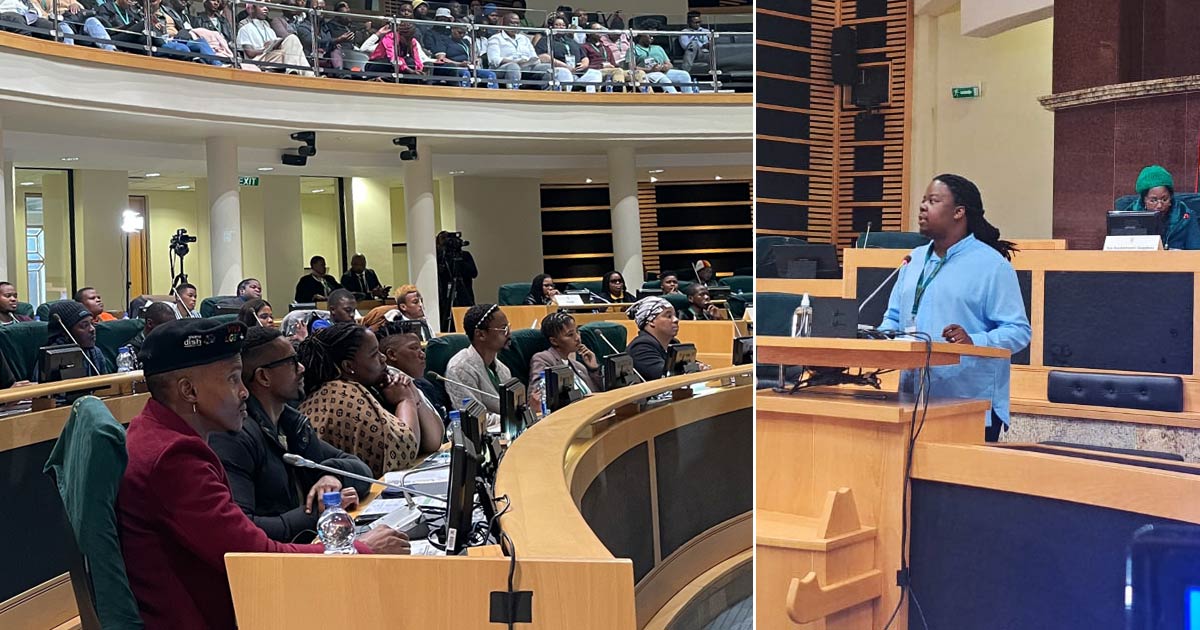Opinion: Queer voices must be valued and protected in the Eastern Cape

Sibonelo Ncanana, Human Rights Coordinator for OUT LGBT Well-being, speaks at the historic gathering at the Eastern Cape Legislature
For the first time since the dawn of democratic South Africa almost 30 years ago, the Eastern Cape Legislature met with queer activists from across the province when it hosted its first LGBTQIA+ Dialogue on 17 August 2023.
This historic moment became a turning point for the Eastern Cape which despite it being the birthplace of globally recognised liberators, is regarded as the most homophobic province in South Africa.
Although appreciative of the initiative, queer activists strongly voiced disappointment at not having a voice at the Dialogue as the format centred on presentations from speakers, and not on the lived experiences and voices of our queer community.
An entry point could be sensitisation workshops for department officials as even at this higher level, there appears to be limited understanding of working with the queer community.
Patriarchy and the Eastern Cape
Homophobia is deeply rooted in patriarchy and patriarchy is deeply rooted in the Eastern Cape, even in so-called ‘progressive-minded’ women and men. We see this across communities, in our workspaces, our religious spaces, in government and even in civil society.
The gate-keepers of violent practices such as homophobia and transphobia are cis-gender heterosexuals who also happen to be the gate-keepers of patriarchy. This results in the queer community living in perpetual fear.
Subtle jokes and humour lead to harassment which manifests in acts of violence or death. Cis-gender heterosexuals need to remember this when they laugh, mock and use slurs such as ‘the alphabet gang, double adaptor, faggot, sissy boy, stabane or moffie’.
Using these words normalises hate which is never okay. Patriarchy, sexism, misogyny, homophobia and transphobia are violent practices, in social and professional work spaces.
Hate crimes have included beheadings and murders
Despite South Africa having a strong set of laws to prohibit and address discrimination, the Eastern Cape Office of the SA Human Rights Commission received 667 complaints during 2022/23, the bulk of which related to sexual orientation. It was also mentioned that 88% of LGBTQIA+ people who experience hate crimes do not report them.
Not too long ago, a school principal in Mdantsane forced 38 teenage girls to publicly announce they were lesbian. In a deeply homophobic province such as ours, this Principal placed these girls’ lives at risk of harassment, rape and even being killed.
More recently, the owner of a business in Gqeberha put up a sign saying ‘LGBTQ not welcome’. The South African Human Rights Commission called for the owner to pay R500,000 fine and that the matter be referred to the National Prosecuting Authority for criminal investigation.
Despite community outrage “almost 700 people have joined a hate speech WhatsApp group formed to support the Gqeberha store that has banned LBGTQ+ people.” According to the Nelson Mandela Bay District Co-ordinator present at the Dialogue, “in recent times there’s been 21 hate crimes in Gqeberha, including beheadings and murders.”
Viewing oppression through an intersectional lens
The plight of transgender and intersex people in accessing healthcare facilities and services was also highlighted at the Dialogue. This becomes dire and life-threatening for those who live in remote rural villages with little or no access to clinics or hospitals. If accessing pre-exposure prophylaxis is challenging for someone living in an informal settlement in an urban Metro, imagine what it’s like for a poor black transgender womxn living in a remote rural village to access hormonal treatments.
One of the key messages from the LGBTQIA+ Dialogue is the need to view oppression from an intersectional lens. Sixty-seven years after the historic Women’s March, we still find ourselves talking about gender equality. After decades of our democracy, we still find ourselves talking about freedom for black people.
For too many, living in the Eastern Cape means living a life of inescapable poverty. The bodies of poor black LGBTQIA+ people remain sites of multiple struggles and when viewed through an intersectional feminist lens, could enable provincial policy and lawmakers to craft better, more appropriate and sustainable interventions to protect our freedom to humanity.
We cannot allow allow gatekeepers to confine and define us
Despite the challenges faced by our queer community, one thing was clear from this Dialogue, at last, there’s political will from our provincial leaders to combat discrimination and hate crimes directed toward us. Of all the provinces throughout the country, only Gauteng had convened similar dialogues with the queer community.
With the Eastern Cape Legislature being the provincial law-making body, resolutions from this Dialogue would be tabled for different provincial government departments to implement. Eyes are now firmly fixed on the Eastern Cape to implement appropriate interventions and for other provinces to follow suit.
As the queer community, it is important that we don’t allow gatekeepers to confine and define us, that we find and re-define our multiple voices and take up space to tell our queer stories of hope, perseverance and resilience. Be a human rights defender and rise with all people. Our queer African voices are valued and must always be protected.
Sikhander Coopoo is a black, queer, Muslim intersectional feminist with backgrounds in gender, pedagogy and local governance; and a social justice and humxn rights activist at heart. He serves on the Gender and Sexuality Alliance of East London committee and writes in his own capacity.
Leave a Reply